Surah Al Masad in English (Surah Tabbat Yada) Arabic and Transliteration
Advertisements
Surah Lahab or tabbat yada Surah, is the 111th chapter of the Qur’an and has only 5 verses. It recounts the punishments that Abu Lahab and his wife will suffer in Hell. Here is everything about surah al Masad in English.
Surah Masad in Arabic
بسم الله الرحمن الرحيم
- تَبَّتْ يَدَا أَبِي لَهَبٍ وَتَبَّ (١)
- مَا أَغْنَى عَنْهُ مَالُهُ وَمَا كَسَبَ (٢)
- سَيَصْلَى نَارًا ذَاتَ لَهَبٍ (٣)
- وَامْرَأَتُهُ حَمَّالَةَ الْحَطَبِ (٤)
- فِي جِيدِهَا حَبْلٌ مِّن مَّسَدٍ (٥)
Surah Al Masad Transliteration
- Tabbati yada Abi Lahabin wattabb.
- Maa agnaa anhu maluhu wama kasabb.
- Sayas laa naran zata lahab.
- Wamur athu hamma laatan hadabb.
- Fi jeediha hablun minm masad.
Surah Tabbat Yada in English
- May the hands of Abu Lahab perish, and may he perish.
- Neither his wealth nor his gains will avail him.
- He will bum in a blazing fire.
- And so will his wife, the carrier of firewood.
- On her neck will be a rope of palm fibres.
Summary Of Tabbat Yada Surah
| Classification | Makki |
| Number of Verses | 5 |
| The Before Surah | Surah An Nasr |
| The After Surah | Surah Al Iklas |
| Other names | The flames, Lahab, Masad |
| Position | Juz 30 |
| Order | 111th |
Is it Surah Lahab or Masad?
The word Lahab in the opening verse gives the Surah its name. However, the surah has been named for its last word masad, which means palm fiber.
What Surah number is Lahab?
The surah number of Lahab is the 111th chapter of Glorious Quran. It is one of the shottest surahs that was revealed in Macca.
Why was Surah Al Masad Revealed?
Although commentators have not denied that it is a Makki Surah, it is impossible to pinpoint exactly when it was revealed in Makkah.
Advertisements
However, given Abu Lahab’s role and behaviour in opposition to the Holy Prophet’s revelation of Truth.
It is reasonable to believe that it was revealed at a time when his passionate antagonism to him had reached new heights, and his attitude was becoming a severe impediment to the spread of Islam.
It’s possible that it was revealed during the period when the Quraish boycotted the Holy Prophet (peace be upon him) and his tribe, besieging them in Shi’b.
Abi Talib, and Abu Lahab was the only one to join the enemies against his own family.
This assumption is based on the fact that Abu Lahab was the Holy Prophet’s uncle, and public criticism of the uncle by the nephew’s mouth could not be suitable until the uncle’s excessive excesses had become obvious to everybody.
Advertisements
What is the meaning of Surah Tabbat yada?
The verb tabba means to be ruined or destroyed, to collapse, perish, or deteriorate.
Abu Lahab was the paternal uncle of the Prophet, he was extremely hostile and tried his utmost to harm the Prophet, for he had no fear of Allah or respect for ties of kinship. May Allah curse him.
Allah criticised him in these harsh terms, which are a source of disgrace for him until the Day of Resurrection.
Allah says: May the hands of Abu Lahab perish, that is, may he be wretched and doomed, and may he perish and never prosper.
Neither his wealth that he has with him and that caused him to transgress nor his gains will avail him.
None of that could ward off any of the punishment of Allah from him when it befalls him.
He will bum in a blazing fire, that is, fire will surround him on all sides, him and his wife, the carrier of firewood.
His wife also tried her utmost to harm the Messenger of Allah.
She and her husband cooperated in sin and transgression, as she planned for evil and tried her hardest to cause harm to the Messenger.
She carried on her back burdens of sin like one who gathers firewood and prepares a rope of palm fibres on his neck to carry it.
It may be that what is meant is that in hell she will carry fuel for her husband’s punishment, wearing around her neck a rope of palm fibres.
Whatever the case, this soorah is one of the amazing signs of Allah, for Allah revealed this soorah when Abu Lahab and his wife had not yet died.
And stated that they would inevitably be punished in the fire, which implied that they would not become Muslim.
And events unfolded as foretold by the Knower of the unseen and the seen.
Background Of Surah Lahab
This is the only place in the Quran where an individual from among the adversaries of Islam is named.
Whereas there were many persons in Makkah and Madinah after the migration who were no less hostile to Islam and the Prophet Muhammad SAW than Abu Lahab.
The question is, what was the distinguishing feature of this person’s personality that led to this naming and shaming?
To comprehend this, one must first comprehend the Arabian society of the time and the position that Abu Lahab played in it.
Since there was chaos and confusion, bloodshed and plunder throughout Arabia in ancient times.
And the condition for centuries was that a person could have no guarantee of the protection of his life, honour, and property except with the help and support of his clansmen and blood relations.
Silah rehmi (good treatment of the kindred) was regarded as the most highly among the moral values of Arabian society.
And breaking off connections with the kindred was regarded as the most highly among the moral values of Arabian society.
When the Holy Prophet (upon whom be peace) began to preach the message of Islam, the other Quraish clans and their chiefs fought him tooth and nail.
But the Bani Hashim and the Bani al-Muttalib (children of al-Muttalib, brother of Hashim) not only did not oppose him, but continued to openly support him, even though most of them had not yet believed in his Prophethood.
The other Quraish tribes considered this support from the Holy Prophet’s blood relatives to be entirely in line with Arabian moral norms.
That is why they never mocked the Bani Hashim and the Bani al-Muttalib for supporting a person preaching a new faith and abandoning their ancestral faith.
They knew and felt that they could never hand over a member of their clan to his adversaries, and that their support and aid to a clansman was quite natural in the eyes of the Quraish and the Arabian people.
This moral ideal, which the Arabs viewed as deserving of respect and inviolability even in their pre-Islamic days of ignorance, was only broken by one man in his hatred of Islam, Abu Lahab, son of Abdul Muttalib.
He was the Holy Prophet’s uncle, and his father and he were both sons of the same father.
Traditionists have related that when the Holy Prophet was commanded to openly present the message of Islam.
And he was instructed in the Quran to warn first of all his nearest kinsfolk of God’s punishment, he ascended Mount Safa one morning and called out aloud: Ya sabahah (O, the morning calamity!).
The individual who spotted an opposing tribe approaching on his tribe early in the morning in Arabia raised the alert.
The people were curious as to who had made the call when the Holy Messenger made it.
They were told that it was Muhammad (peace be upon him).
There, people from all of Quraish’s clans rushed out. Everyone that was able to came.
When the People had gathered, the Holy Messenger addressed each tribe by name, saying: O Bani Hashim, O Bani Abdul Muttalib, O Bani Fihr, O Bani such and so.
“Would you believe me if I told you there was an enemy force waiting to attack you behind the hill?”
The crowd erupted in laughter, declaring that they had never witnessed him lie before.
“Then I warn you that you are on your way to a torture,” the Holy Prophet warned.
“May you perish!” shouted Abu Lahab, the Holy Prophet’s uncle, before anybody else could speak.
“Did you call us in for this?”
According to another legend, he picked up a stone and threw it at the Holy Prophet.
(Bukhari)
This man followed the Holy Prophet wherever he went to preach Islam and barred the people from listening to him.
This person was named in this Surah because of these very sins, and there was an unique need for it.
When the Holy Prophet’s own uncle followed him and opposed him in front of the Arabs who had come for hajj from outside Makkah, or who had assembled in various routes.
Who Is The Father Of Flames?
His real name was Abd alUzza, but he was known as Abu Lahab because of his ruddy, glowing complexion. Lahab means a flaming, fiery face, and Abu Lahab means a person with a flaming, fiery face.
There are numerous reasons why he is referred to here by his nickname (Kunyat) rather than his given name.
- First, he was better known by his nickname than by his real name.
- Second, the Qur’an forbade him from being referred to by his polytheistic name, Abd al’Uzza (slave of Uzza).
- Third, his kunyat corresponds to his fate as described in this Surah.
Tafseer Surah Masad in English
Tabbat yada Abi Lahab has been translated as “May Abu Lahab’s hands be shattered,” and tabby as “may he perish” or “he perished” by some commentators.
However, this was not a curse cast upon him, but rather a prophecy in which a future event is portrayed in the past tense, implying that its occurrence is certain and unavoidable.
In reality, the same thing transpired at long last that had been predicted in this Surah a few years before.
Breaking of the hands certainly does not suggest literal breaking of the hands, but rather a person’s complete failure in his goal and target for which he has given his all.
And Abu Lahab had done everything he could to thwart and disrupt the Holy Prophet’s message of Islam (upon whom be peace).
Both of these interpretations are accurate for Abu Lahab’s end.
Because when he was struck by the malignant pustule, his money was useless, and his children abandoned him to die a horrible, wretched death.
They didn’t even bury him in a dignified manner.
Thus, within a few years, the people witnessed the precise fulfilment of the prophecy stated in this Surah about Abu Lahab.
Who Is The Wife Of Abu Lahab?
Arwa was her given name, and Umm Jamil was her nickname (kunyat). She was Abu Sufyan’s sister, and her hatred of the Holy Messenger was equal to that of her husband, Abu Lahab.
Abu Bakr’s daughter, Asma Bint Abubakar, claims that when this Surah was revealed and Umm Jamil heard it, she became enraged and went in search of the Holy Prophet (upon whom be peace).
She was carrying a handful of stones and crying her own lyrics, satirising the Holy Prophet.
She arrived at the Ka’bah, where Abu Bakr sat with the Holy Prophet. He said,
“O Messenger of Allah, there she comes, and I am afraid that she may say something insulting to you,”
“She will not see me,” the Holy Prophet responded.
Exactly the same thing occurred. Despite the fact that the Holy Prophet was present, she was unable to see him.
She said to Abubakar, “I hear your Companion has satirised me,”
“No, by the Lord of this house, he has not satirised you,” Abu Bakr replied.
She exploded when she heard this.
The original words are hammalat al-hatab, which roughly translates to “carrier of the wood.”
It has been interpreted in a variety of ways by the commentators.
According to Abdullahi Bin Abbas, she used to strew thorns at the Holy Prophet’s door in the night, hence she has been regarded as a carrier of the wood.”
Her neck is referred to as a jid, which in Arabic refers to a decorated neck.
That is why the word jid is used humorously here, meaning that in Hell she would wear a palm-fibre rope around her neck instead of the necklace on which she so arrogantly prides herself.
The rope that will be placed around her neck has been given the name babl-um min-masad, indicating that it will be a masad rope.
Commentators have suggested several interpretations of this.
Some say masad refers to a tightly twisted rope; others say it refers to a rope made of palm fibre; still others say it refers to a rope made of rush, camel skin, or camel hair.
Surah Kausar is another beautiful and short chapter of the Quran. Also learn why was Surah Al Falaq Revealed.
May Allah Grant Us Success.
Advertisements

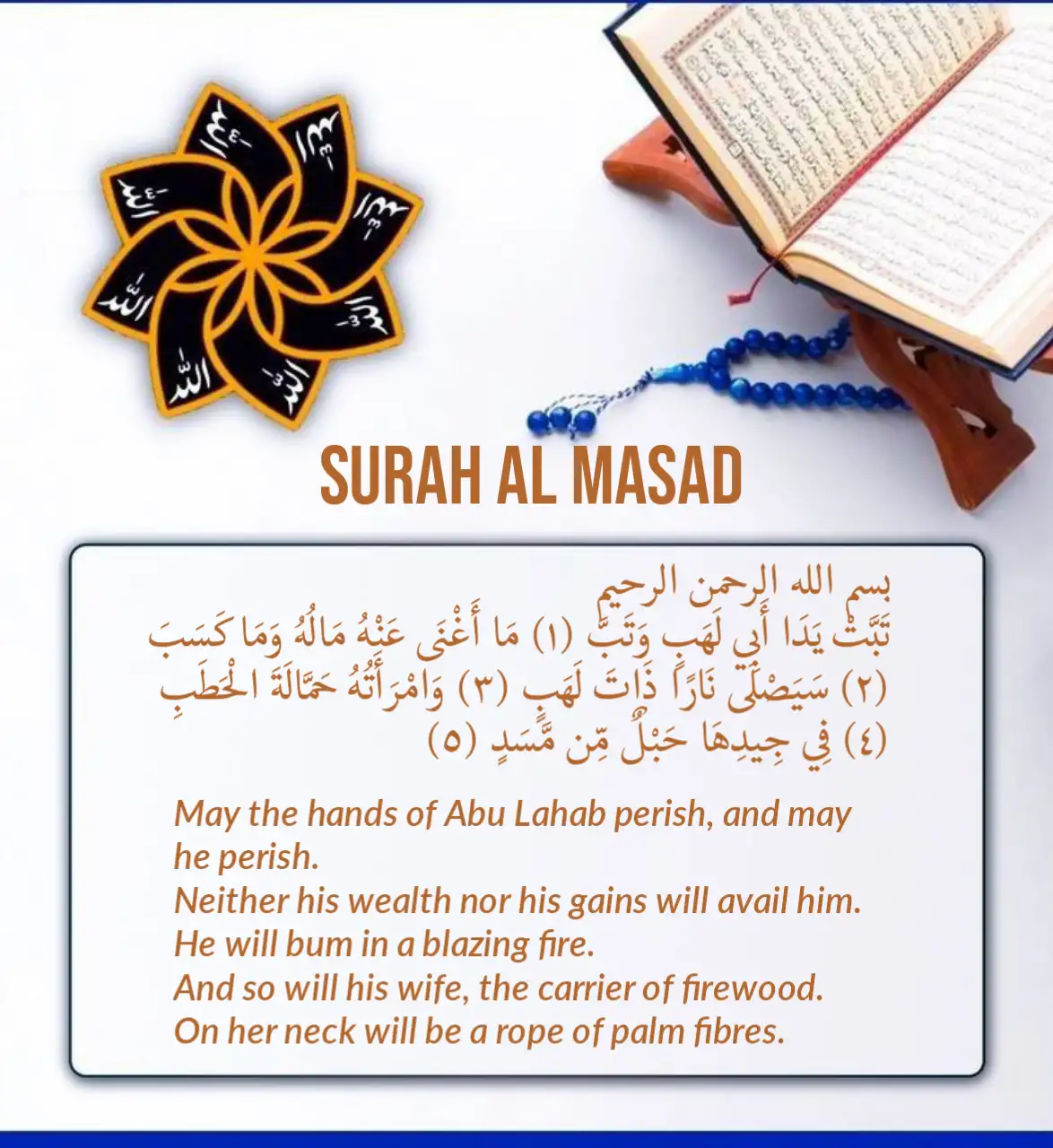
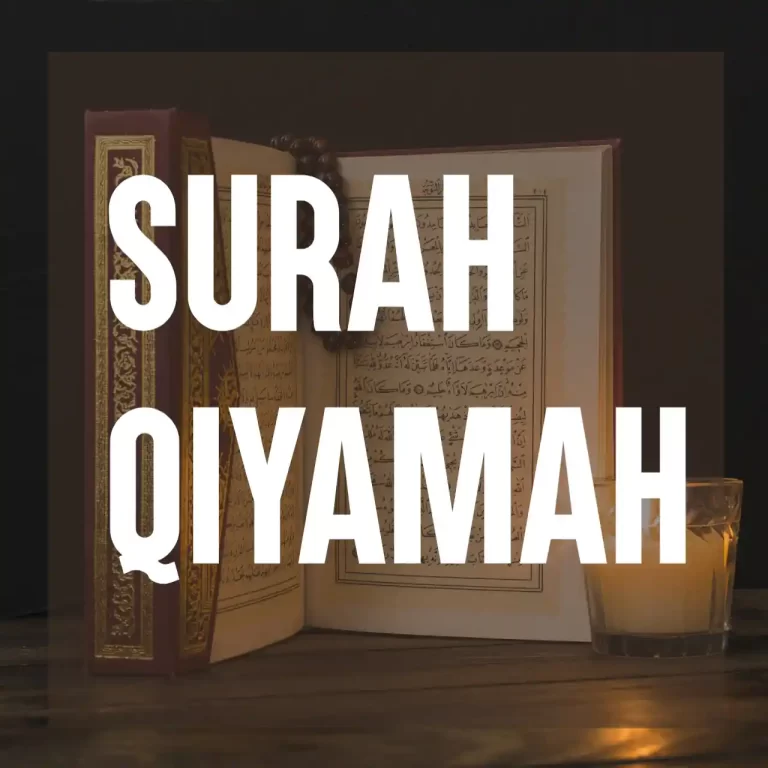
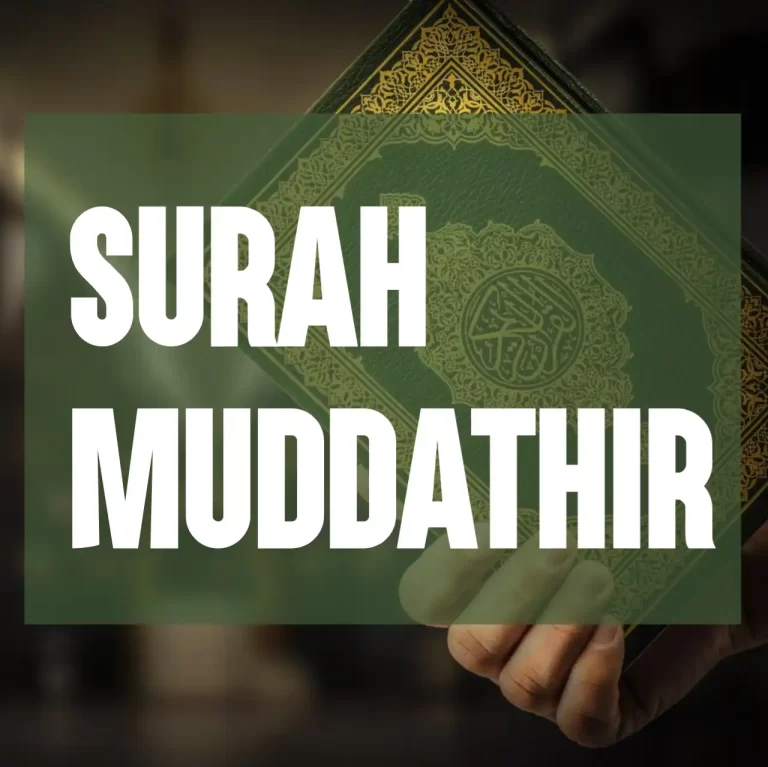


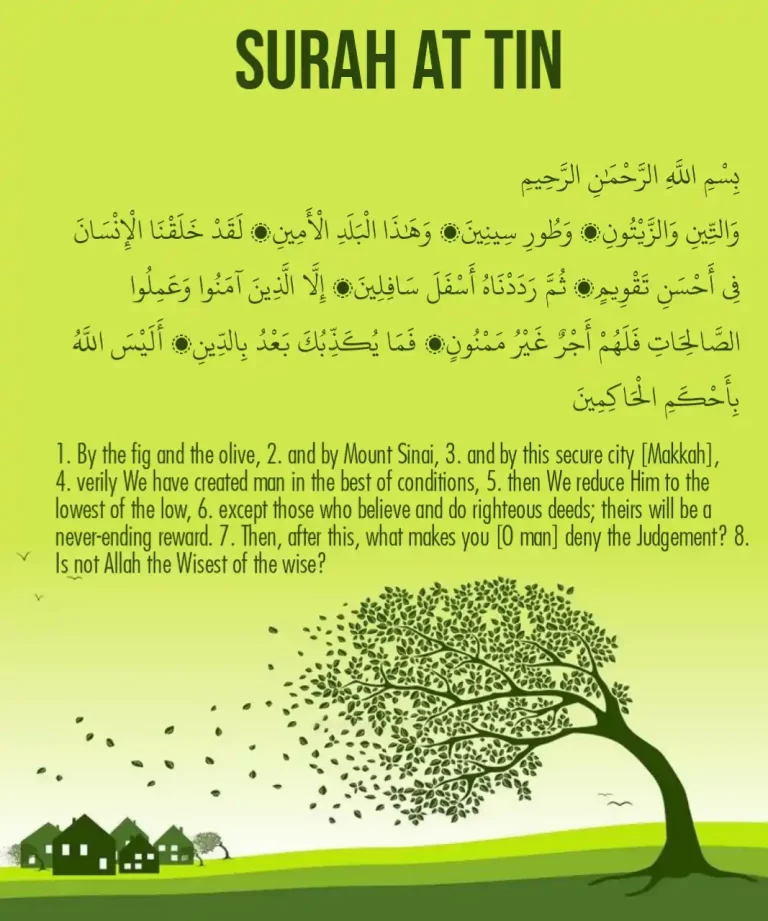
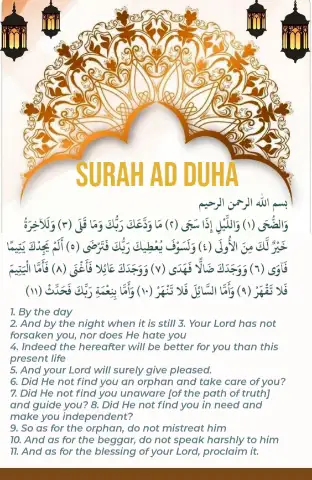
2 Comments